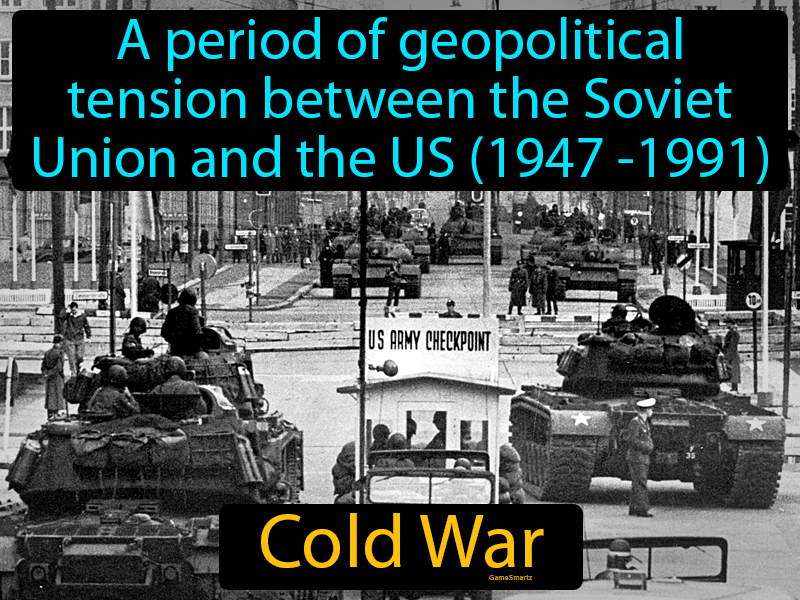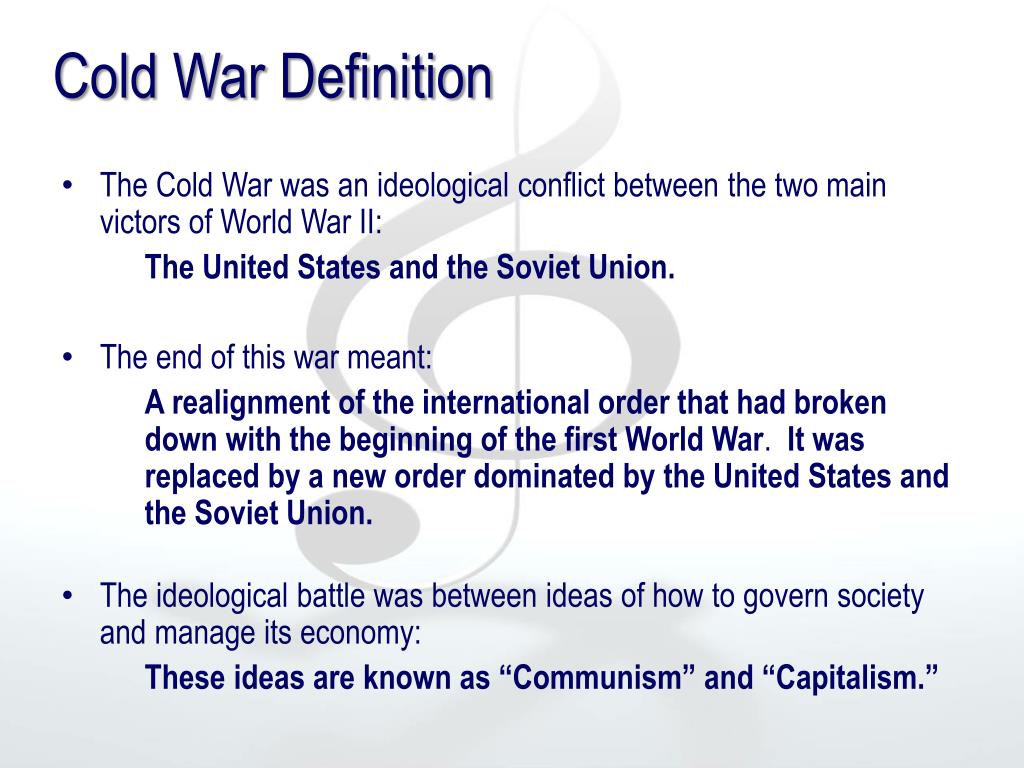The Cold War was a geopolitical conflict between the United States and the Soviet Union that lasted from the end of World War II until the early 1990s. It shaped global politics, economics, and culture, leaving a lasting impact on the modern world. This era was marked by ideological battles, military alliances, and technological advancements that defined international relations during this time.
The Cold War is one of the most significant periods in modern history, influencing global politics and shaping the world we live in today. Understanding its definition, causes, and consequences provides valuable insights into the complexities of international relations and the delicate balance of power between nations.
This article aims to explore the Cold War definition in depth, including its origins, key events, and lasting impact on global politics. Whether you're a history enthusiast or simply curious about this pivotal period, this guide will provide a comprehensive overview of the Cold War and its significance.
Read also:Superlative Actors In The Parks And Recreation Phenomenon A Detailed Analysis
Table of Contents
- What is the Cold War?
- Origins of the Cold War
- Key Players in the Cold War
- Major Events of the Cold War
- Cold War Ideologies
- The Role of Military Alliances
- Technological Advancements During the Cold War
- Impact on Global Politics
- End of the Cold War
- Legacy of the Cold War
What is the Cold War?
The Cold War refers to the prolonged period of geopolitical tension between the United States and the Soviet Union, which lasted from the end of World War II in 1945 until the dissolution of the Soviet Union in 1991. Unlike traditional wars, the Cold War did not involve direct military conflict between the two superpowers. Instead, it was characterized by ideological battles, espionage, proxy wars, and an arms race.
Defining Characteristics of the Cold War
The Cold War was defined by several key characteristics:
- Ideological conflict between capitalism and communism
- Formation of military alliances such as NATO and the Warsaw Pact
- Proxy wars fought in regions like Korea, Vietnam, and Afghanistan
- An arms race, particularly in nuclear weapons
These elements contributed to the complex dynamics of the Cold War, shaping global politics for nearly five decades.
Origins of the Cold War
The origins of the Cold War can be traced back to the aftermath of World War II. The alliance between the United States and the Soviet Union, formed to defeat Nazi Germany, began to deteriorate as ideological differences emerged. The Soviet Union sought to expand its influence in Eastern Europe, while the United States aimed to promote democracy and capitalism worldwide.
Key Factors Leading to the Cold War
Several factors contributed to the onset of the Cold War:
- Different political ideologies: Capitalism vs. Communism
- Disagreements over post-war reconstruction in Europe
- Soviet expansion into Eastern Europe
- The Truman Doctrine and the Marshall Plan
These factors created a climate of mistrust and competition between the two superpowers, setting the stage for the Cold War.
Read also:Was Christina Murphys Body Recovered Unraveling The Truth
Key Players in the Cold War
The Cold War involved numerous countries, but the primary players were the United States and the Soviet Union. Both nations played pivotal roles in shaping the course of the conflict, with their actions influencing global politics throughout the era.
Other Important Nations
Besides the two superpowers, other nations also played significant roles during the Cold War:
- China: Initially allied with the Soviet Union, later became a rival
- Germany: Divided into East and West, symbolizing the ideological divide
- Cuba: A key player in the Cuban Missile Crisis
These nations, among others, contributed to the complexity of the Cold War and its global reach.
Major Events of the Cold War
The Cold War was marked by several major events that shaped its course and outcome. These events highlight the intensity of the conflict and the stakes involved in the geopolitical rivalry.
Notable Events
- Berlin Blockade and Airlift (1948-1949)
- Korean War (1950-1953)
- Cuban Missile Crisis (1962)
- Vietnam War (1955-1975)
- Fall of the Berlin Wall (1989)
Each of these events played a crucial role in the development and eventual conclusion of the Cold War.
Cold War Ideologies
Ideological differences were at the heart of the Cold War. The United States promoted democracy and capitalism, while the Soviet Union advocated for communism and a planned economy. These opposing ideologies fueled the conflict and influenced global politics during this era.
Capitalism vs. Communism
The ideological battle between capitalism and communism was central to the Cold War. Capitalism emphasized individual freedom and market-driven economies, while communism focused on collective ownership and state-controlled economies. This ideological divide shaped the policies and actions of both superpowers throughout the conflict.
The Role of Military Alliances
Military alliances played a crucial role in the Cold War, providing a framework for cooperation and defense among nations aligned with either the United States or the Soviet Union. These alliances reinforced the ideological divide and contributed to the militarization of the conflict.
Key Alliances
- NATO (North Atlantic Treaty Organization): Formed by the United States and its Western allies
- Warsaw Pact: Established by the Soviet Union and its Eastern European satellites
These alliances ensured mutual defense and cooperation among member nations, further entrenching the divisions of the Cold War.
Technological Advancements During the Cold War
The Cold War was a period of rapid technological advancements, driven by the competition between the United States and the Soviet Union. These advancements had lasting impacts on science, technology, and global security.
Key Developments
- Space Race: The competition to explore and dominate space
- Nuclear Weapons: The development and proliferation of nuclear arsenals
- Computers and Communication: Advances in computing and telecommunications
These technological breakthroughs not only influenced the Cold War but also shaped the modern world.
Impact on Global Politics
The Cold War had a profound impact on global politics, reshaping international relations and influencing the policies of nations worldwide. Its legacy continues to affect global dynamics today.
Long-Term Effects
- Establishment of a bipolar world order
- Proliferation of nuclear weapons
- Emergence of new nations following decolonization
These effects highlight the lasting influence of the Cold War on global politics and international relations.
End of the Cold War
The Cold War came to an end in the early 1990s with the dissolution of the Soviet Union. This marked a significant turning point in global history, leading to a unipolar world dominated by the United States.
Factors Contributing to the End
- Economic difficulties in the Soviet Union
- Gorbachev's policies of glasnost and perestroika
- Fall of the Berlin Wall
These factors, among others, contributed to the conclusion of the Cold War and the transformation of the global political landscape.
Legacy of the Cold War
The legacy of the Cold War is complex and multifaceted, influencing global politics, economics, and culture in numerous ways. Its impact continues to shape the modern world, reminding us of the importance of understanding this pivotal period in history.
Key Takeaways
- The Cold War defined global politics for nearly five decades
- Its ideological battles and technological advancements shaped the modern world
- The lessons learned from the Cold War remain relevant today
In conclusion, the Cold War was a defining era in modern history, leaving a lasting legacy that continues to influence global politics and international relations. By understanding its definition, causes, and consequences, we can gain valuable insights into the complexities of the world we live in today.
As you explore the history of the Cold War, consider sharing your thoughts and insights in the comments below. Engaging with the material and discussing its implications can deepen your understanding and appreciation of this pivotal period in history. Additionally, feel free to explore other articles on our site for further insights into global history and politics.

